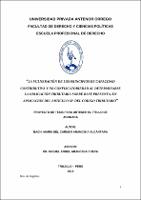Mostrar el registro sencillo del ítem
La vulneración de los principios de capacidad contributiva y no confiscatoriedad al determinarse la obligación tributaria sobre base presunta, en aplicación del artículo 68° del código tributario
| dc.contributor.advisor | Arancibia Cueva, Miguel Ángel | |
| dc.contributor.author | Arancibia Alcantara, María del Carmen | |
| dc.creator | Arancibia Alcantara, María del Carmen | |
| dc.date.accessioned | 2018-06-04T15:34:46Z | |
| dc.date.available | 2018-06-04T15:34:46Z | |
| dc.date.issued | 2018 | |
| dc.identifier.uri | https://hdl.handle.net/20.500.12759/4119 | |
| dc.description.abstract | La tesis denominada “La vulneración de los principios de capacidad contributiva y no confiscatoriedad al determinarse la obligación tributaria sobre base presunta, en aplicación del artículo 68º del código tributario” surge por la necesidad de analizar estrictamente los efectos jurídicos que conlleva la vulneración de los principios de capacidad contributiva y no confiscatoriedad en el artículo 68º del Código Tributario, respecto a la presunción de ingresos omitidos por ventas, servicios u operaciones gravadas, por diferencia entre los montos registrados o declarados por el contribuyente y los estimados o proyectados por la administración tributaria como consecuencia del control directo del dinero recibido por el contribuyente durante cinco días comerciales. En tal sentido, la presente investigación plantea la siguiente problemática: ¿Cuáles son los efectos jurídicos de la vulneración de los principios de capacidad contributiva y no confiscatoriedad al determinarse una obligación tributaria sobre base presunta, aplicando el artículo 68º del Código Tributario?, y determina como hipótesis que en efecto, la determinación de la obligación tributaria sobre base presunta, específicamente, al aplicar el artículo 68º del Código Tributario, vulnerarían los principios de no confiscatoriedad y capacidad contributiva. Por tal motivo, mediante el uso de la investigación descriptiva, así como la utilización de la técnica del fichaje y análisis de datos, conllevó a analizar la legislación, doctrina y jurisprudencia para demostrar dicha hipótesis de que, si bien es cierto una de las facultades que ejerce la Administración para establecer la cuantía del tributo es la de DETERMINACIÓN, esta debería de realizarse mediante un uso correcto, puesto que al existir omisión de ingresos, no hay fehaciencia en los hechos que sustentarían la base de la deuda tributaria. De tal manera se ha concluido que la seguridad jurídica y los principios de no confiscatoriedad y capacidad contributiva se verían alterados, constituyendo un arma destructiva del poder estatal. | es_PE |
| dc.description.abstract | The thesis called ““The violation of the principles of contributory capacity and non-confiscatory nature to determine the tax liability on presumptive basis, in application of Article 68 of the tax code““ arises from the need to strictly analyze the legal effects entailed by the violation of the principles of contributory capacity and non-confiscation in article 68 of the Tax Code, regarding the presumption of income omitted from sales, services or taxed operations, by difference between the amounts recorded or declared by the taxpayer and those estimated or projected by the tax administration as consequence of direct control of the money received by the taxpayer during five business days. In this regard, the present investigation poses the following problem: What are the legal effects of the violation of the principles of taxpaying capacity and non- confiscatory when determining a tax obligation on presumptive basis, applying Article 68 of the Tax Code ?, and determines as a hypothesis that, in effect, the determination of the tax obligation on an alleged basis, specifically, when applying Article 68 of the Tax Code, would violate the principles of non- confiscatory and taxable capacity. For this reason, through the use of descriptive research, as well as the use of the technique of data acquisition and analysis, led to analyze the legislation, doctrine and jurisprudence to demonstrate this hypothesis that, although one of the faculties is true that the Administration exercises to establish the amount of the tax is that of DETERMINATION, this should be done through correct use, since in the absence of income, there is no evidence in the facts that would sustain the tax debt base. In this way it has been concluded that legal security and the principles of non- confiscatory and contributory capacity would be altered, constituting a destructive weapon of state power, | en_US |
| dc.description.uri | Tesis | es_PE |
| dc.format | application/pdf | es_PE |
| dc.language.iso | spa | es_PE |
| dc.publisher | Universidad Privada Antenor Orrego - UPAO | es_PE |
| dc.relation.ispartofseries | T_DERE_402 | |
| dc.rights | info:eu-repo/semantics/openAccess | es_PE |
| dc.source | Universidad Privada Antenor Orrego | es_PE |
| dc.source | Repositorio Institucional - UPAO | es_PE |
| dc.subject | Principios de capacidad contributiva | es_PE |
| dc.title | La vulneración de los principios de capacidad contributiva y no confiscatoriedad al determinarse la obligación tributaria sobre base presunta, en aplicación del artículo 68° del código tributario | es_PE |
| dc.type | info:eu-repo/semantics/bachelorThesis | es_PE |
| thesis.degree.level | Titulo Profesional | es_PE |
| thesis.degree.grantor | Universidad Privada Antenor Orrego. Facultad de Derecho y Ciencias Politicas | es_PE |
| thesis.degree.name | Abogado | es_PE |
| thesis.degree.discipline | Derecho | es_PE |
Ficheros en el ítem
Este ítem aparece en la(s) siguiente(s) colección(es)
-
Derecho [434]

